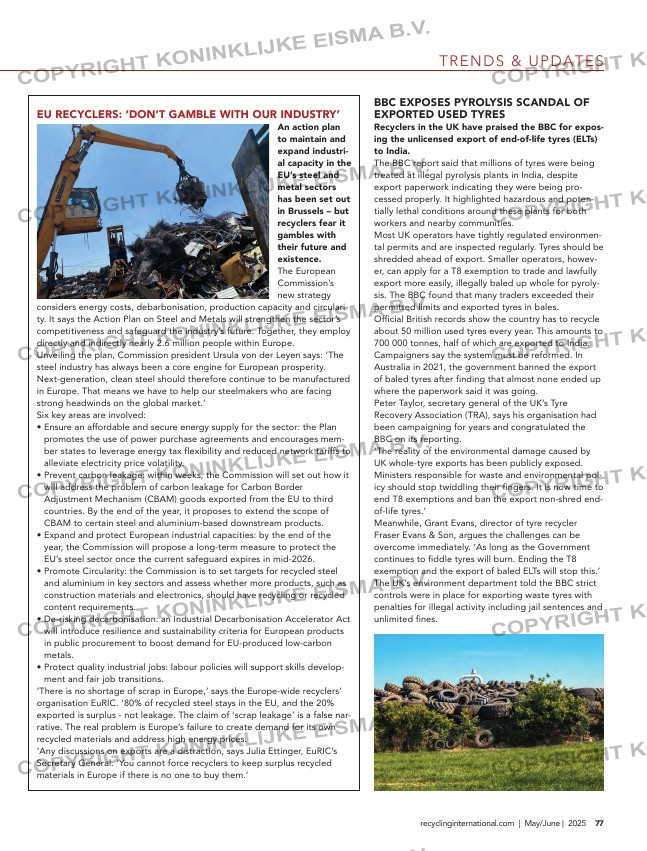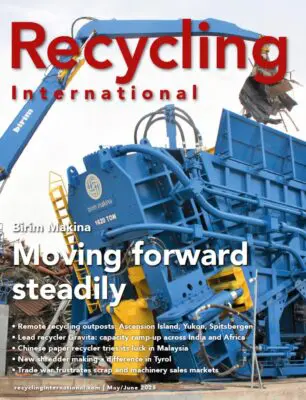Page 77 from: Recycling International May/June issue

TRENDS & UPDATES
77recyclinginternational.com | May/June | 2025
phone: +39 010414546 Email: [email protected] www.protec-srl.com
‘ACHIEVE TEXTILE CIRCULARITY THROUGH
COLLABORATION’
Stronger collaboration between indus-
try, policymakers and global partners
to build a circular textile economy has
been urged at a conference in
Brussels.
Key barriers to achieving circularity were
identified as being low demand for
recycled materials, the gap between EU
policies and business realities, unfair
competition from countries such as China, and the dominance of fast fashion.
The event, organised by Euric, the European recyclers’ umbrella, emphasised
the need for a systemic shift towards a circular economy, with a strong focus on
legislative action and innovation.
For the European Environment Agency, Lars Fogh Mortensen presented the
agency’s latest briefing on the circularity of the EU textiles value chain which
suggests a successful strategy requires a systemic shift towards higher quality,
longer use, and increased reuse, repair, and recycling.
Elisa Tonda from the United Nations Environment Programme stressed that
clarifying the definition of textile ‘waste’, creating infrastructure for circularity,
and improving company practices were essential if the sector was to become
more circular and sustainable.
During a panel discussion, Rasmus Nordqvist stressed the need to tackle chal-
lenges related to emerging online platforms and fast fashion. Jana Hrčková
from sports retailer Decathlon emphasised the importance of harmonised
extended producer responsibility systems, as well as securing financial support
at both EU and national levels to promote recycling. Bertram Wevers, repre-
senting textile recycler Frankenhuis, pointed out that while recycling technolo-
gy was available, demand for recycled materials remained insufficient. He
argued there was too narrow a focus on fibre-to-fibre recycling rather than a
more holistic approach.
For the European Commission, Chiel Berends suggested textile waste be
included in global regulatory frameworks such as the Basel Convention. Ana
Rodes (Recover) and Martin Böschen (TEXAID) called for clear regulations and
guidelines for customs authorities inspecting shipments of used textiles or
recycled fibres, as well as the importance of financing waste streams through
mechanisms such as EPR schemes.
Mustafa Sattar (Retex Global) raised concerns about the competitive pressures
from countries like China, urging the need for better data to address these
challenges.
BBC EXPOSES PYROLYSIS SCANDAL OF
EXPORTED USED TYRES
Recyclers in the UK have praised the BBC for expos-
ing the unlicensed export of end-of-life tyres (ELTs)
to India.
The BBC report said that millions of tyres were being
treated at illegal pyrolysis plants in India, despite
export paperwork indicating they were being pro-
cessed properly. It highlighted hazardous and poten-
tially lethal conditions around these plants for both
workers and nearby communities.
Most UK operators have tightly regulated environmen-
tal permits and are inspected regularly. Tyres should be
shredded ahead of export. Smaller operators, howev-
er, can apply for a T8 exemption to trade and lawfully
export more easily, illegally baled up whole for pyroly-
sis. The BBC found that many traders exceeded their
permitted limits and exported tyres in bales.
Official British records show the country has to recycle
about 50 million used tyres every year. This amounts to
700 000 tonnes, half of which are exported to India.
Campaigners say the system must be reformed. In
Australia in 2021, the government banned the export
of baled tyres after finding that almost none ended up
where the paperwork said it was going.
Peter Taylor, secretary general of the UK’s Tyre
Recovery Association (TRA), says his organisation had
been campaigning for years and congratulated the
BBC on its reporting.
‘The reality of the environmental damage caused by
UK whole-tyre exports has been publicly exposed.
Ministers responsible for waste and environmental pol-
icy should stop twiddling their fingers. It is now time to
end T8 exemptions and ban the export non-shred end-
of-life tyres.’
Meanwhile, Grant Evans, director of tyre recycler
Fraser Evans & Son, argues the challenges can be
overcome immediately. ‘As long as the Government
continues to fiddle tyres will burn. Ending the T8
exemption and the export of baled ELTs will stop this.’
The UK’s environment department told the BBC strict
controls were in place for exporting waste tyres with
penalties for illegal activity including jail sentences and
unlimited fines.
EU RECYCLERS: ‘DON’T GAMBLE WITH OUR INDUSTRY’
An action plan
to maintain and
expand industri-
al capacity in the
EU’s steel and
metal sectors
has been set out
in Brussels – but
recyclers fear it
gambles with
their future and
existence.
The European
Commission’s
new strategy
considers energy costs, debarbonisation, production capacity and circulari-
ty. It says the Action Plan on Steel and Metals will strengthen the sector’s
competitiveness and safeguard the industry’s future. Together, they employ
directly and indirectly nearly 2.6 million people within Europe.
Unveiling the plan, Commission president Ursula von der Leyen says: ‘The
steel industry has always been a core engine for European prosperity.
Next-generation, clean steel should therefore continue to be manufactured
in Europe. That means we have to help our steelmakers who are facing
strong headwinds on the global market.’
Six key areas are involved:
• Ensure an affordable and secure energy supply for the sector: the Plan
promotes the use of power purchase agreements and encourages mem-
ber states to leverage energy tax flexibility and reduced network tariffs to
alleviate electricity price volatility.
• Prevent carbon leakage: within weeks, the Commission will set out how it
will address the problem of carbon leakage for Carbon Border
Adjustment Mechanism (CBAM) goods exported from the EU to third
countries. By the end of the year, it proposes to extend the scope of
CBAM to certain steel and aluminium-based downstream products.
• Expand and protect European industrial capacities: by the end of the
year, the Commission will propose a long-term measure to protect the
EU’s steel sector once the current safeguard expires in mid-2026.
• Promote Circularity: the Commission is to set targets for recycled steel
and aluminium in key sectors and assess whether more products, such as
construction materials and electronics, should have recycling or recycled
content requirements.
• De-risking decarbonisation: an Industrial Decarbonisation Accelerator Act
will introduce resilience and sustainability criteria for European products
in public procurement to boost demand for EU-produced low-carbon
metals.
• Protect quality industrial jobs: labour policies will support skills develop-
ment and fair job transitions.
‘There is no shortage of scrap in Europe,’ says the Europe-wide recyclers’
organisation EuRIC. ‘80% of recycled steel stays in the EU, and the 20%
exported is surplus – not leakage. The claim of ‘scrap leakage’ is a false nar-
rative. The real problem is Europe’s failure to create demand for its own
recycled materials and address high energy prices.
‘Any discussions on exports are a distraction, says Julia Ettinger, EuRIC’s
Secretary General. ‘You cannot force recyclers to keep surplus recycled
materials in Europe if there is no one to buy them.’
74-75-76-77_trendsupdatesiiadv.indd 77 10-04-2025 15:48



